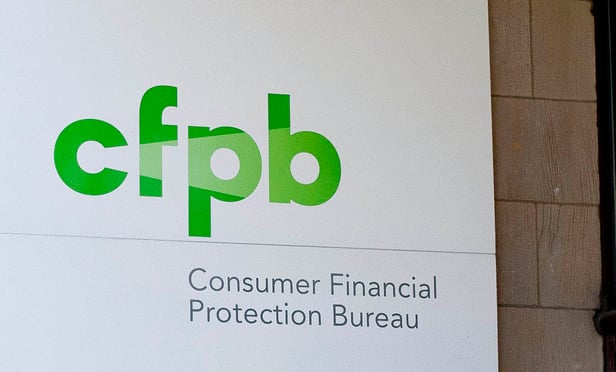 Consumer Financial Protection Bureau building in Washington, D.C. Photo by Diego M. Radzinschi
Consumer Financial Protection Bureau building in Washington, D.C. Photo by Diego M. Radzinschi
The CFPB on Wednesday proposed allowing short-term, small-dollar lenders to make loans without determining whether a borrower has a reasonable chance of repaying the loan.
The proposal would eliminate those sections of the agency's 2017 rule, a move long sought by Republican opponents of agency operations.
Recommended For You
In proposing to rescind that section of its 2017 rule, the agency said that the old rule would limit consumer access to credit. That proposal will be open for comment for 90 days after it is published in the Federal Register.
The agency said that rescinding the rule might allow credit unions and banks with under $10 billion in assets to begin offering short-term loans. Under the 2017 rule, loans modeled after the NCUA's Payday Alternative Loan plan, were exempt from the rule.
The bureau said that that agency officials believe that there was insufficient evidence and legal documentation to justify the 2017 rule. The agency said that the research the agency used was not "sufficiently robust and reliable."
The agency also proposed to delay the August 19, 2019 effective date for the mandatory underwriting provisions to November 19, 2020.
The agency is not proposing to reconsider the payments section of the 2017 rule.
The strict payday lending rules were issued by then-Director Richard Cordray, an Obama Administration nominee, in 2017. When Cordray left to run for Ohio governor, then-Acting Director Mick Mulvaney said he intended to reexamine that rule.
CEFP Director Kathy Kraninger is now implementing that promise.
Credit union trade groups praised the decision to re-examine the ability-to-pay sections of the 2017 rule.
"NAFCU supports the removal of problematic ability to repay portions of the rule, but we also want to ensure, that going forward, the egregious practices of certain payday lenders are addressed" NAFCU President/CEO B. Dan Berger said.
CUNA officials said they are examining the proposal, but Ryan Donovan, the group's chief advocacy officer said, "We support bureau efforts to revise this rule, and urge the bureau to ensure these changes do not inhibit credit unions participating in the short-term, small-dollar loan market."
Kraninger said she will work with state and federal regulators to determine how to revise the rule.
"The Bureau will evaluate the comments, weigh the evidence, and then make its decision," Kraninger said. "In the meantime, I look forward to working with fellow state and federal regulators to enforce the law against bad actors and encourage robust market competition to improve access, quality, and cost of credit for consumers."
Specifically, the CFPB proposal would:
- Rescind provisions of the rule that concluded it was an abusive practice for a lender to make a short-term or longer-term balloon payment loan, including payday and vehicle title loans, without determining that consumers have an ability to repay the loan.
- Rescind provisions that prescribed mandatory underwriting requirements for making the ability-to-repay decision.
The CFPB said that the number of complaints the bureau has received about payday loans has decreased, in part, because of state regulation.
The CFPB said that in 2016, the agency received about 4,400 complaints about those loans; in 2017, the agency received 2,900 complaints. That number dropped to 2,300 complaints in 2018.
The agency also said that between 80% and 85% of the borrowers taking out payday loans successfully repay them.
The bureau is proposing to delay the underwriting provisions because they would require lenders to comply with a rule that might be rescinded. In addition, they said that since the 2017 rule was issued, potential "obstacles to compliance" have been discovered.
© 2025 ALM Global, LLC, All Rights Reserved. Request academic re-use from www.copyright.com. All other uses, submit a request to [email protected]. For more information visit Asset & Logo Licensing.






